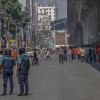Poverty, inequality, food insecurity rise in urban areas: Sanem

Food security declined, inequality deepened and poverty rose in Bangladesh in the last five years owing to the twin shocks of the coronavirus pandemic and price spiral, said the South Asian Network on Economic Modeling (Sanem).
And people who live in urban areas have been impacted more than those in the rural areas, said the think-tank.
The observation is based on a survey that was carried out among more than 9,000 households countrywide in October-November of 2023.
Under the headcount poverty rates measurement, it was found that the urban upper poverty rate increased from 16.3 percent to 18.7 percent between 2018 and 2023.
The data is different from the Household Income and Expenditure Survey (HIES) of the Bangladesh Bureau of Statistics (BBS) published in 2022 when the price hike shock was not as severe as it was in 2023, said Prof Selim Raihan, executive director of the Sanem.
He made the comments as he presented the survey results of the Sanem at a session of the 7th edition of the Sanem Annual Economists' Conference (SAEC) at the Brac Centre Inn today.
According to the HIES 2022, the urban upper poverty rate was 14.7 percent.
Under the multidimensional poverty index measurement method, it also increased to 18 percent in 2023 from 16.8 percent in 2018, according to the Sanem.
However, the national poverty rate was almost unchanged during the five-year period on the back of a fall in rates in rural areas under both methods: it was 20.7 percent last year compared to 21.6 percent in 2018.
Bangladesh lowered poverty at a rate of 3 percent per year between 1990 and 2016. However, this momentum was impacted by the pandemic as many lost livelihoods and slipped below the poverty line because of the nationwide lockdowns imposed to limit the spread of the deadly virus.
The price shock in the post-pandemic period might be the contributing factor to the recent stagnation in the poverty reduction process, Prof Raihan said.
In all indicators, food insecurity rose and the severity of the insecurity was higher in urban areas than in the countryside.
"It is very alarming," he said.
During the pandemic, around 60 percent of the surveyed households faced challenges related to employment and earnings.
The price of essentials was also another major challenge and major coping strategies involved involuntary changes to dietary patterns and borrowing.
In the post-pandemic scenario, more than 85 percent of the households that the current price spike has affected their livelihoods. Almost a third of the households have changed their dietary patterns to survive.
In the last five years, inequality also widened.
The youth rate of NEET (not in employment, education, or training) has increased for both males and females, the think-tank said. The NEETs are a group of population aged 15-24.
The Sanem said 15 percent of school-aged children, ranging from five years to 15 years, were out of education in 2023 while it was 13 percent five years earlier.
The Sanem found that one-third of migrant workers who returned permanently remained unemployed in 2023.
The access to healthcare also worsened last year amid price shocks: 7.2 percent of the population could not access healthcare in 2023, way higher than 1.7 percent in 2018.
The Consumer Price Index rose 9.02 percent in FY23 against the government's revised target of 7.5 percent. This was the highest average inflation rate in 12 years, according to the BBS.
Based on the findings, the Sanem proposed an overhaul of social security support programmes for the poor and vulnerable poor, particularly in the urban areas.
It also suggested allocating more budgets and formulating specific policies for the education sector and more support for the returnee migrant workers.
The session was chaired by Sohela Nazneen, a senior research fellow of the Institute of Development Studies under the University of Sussex, while Yugesh Pradhanang, project manager of the UNDP Bangladesh, also spoke.

 For all latest news, follow The Daily Star's Google News channel.
For all latest news, follow The Daily Star's Google News channel. 








Comments